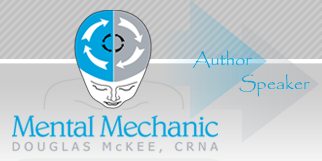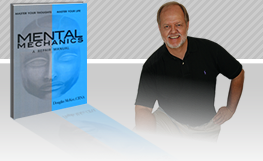|
Douglas McKee
Hello, my name is Doug McKee. I am a Nurse
Anesthetist. I have been practicing anesthesia for 35
years and the one thing all my patients have in common
is they are really afraid of anesthesia, and so are
their families. Trying different approaches to help
calm my patients pre-op quickly taught me that fear
and reasoning are two very different thought processes.
I started studying fear so I could help them be calmer.
This is what I learned. Fear is a reactionary
process that takes place in a part of our brain that
has no ability to reason at all. Learning this was all
the evidence needed to conclude that any fear we feel
not associated with actual danger comes from faulty
thinking, and it isn't real. What that means to us is
that 99.9% of our fears can be eliminated from our lives.
Danger is real and we feel fear when
confronted with the threat of actual harm. For example,
stepping out in front of a car puts us in danger and
we take action to get out of the way. On the other hand,
if we are feeling stressed or worried and we look around,
we will see there isn’t any real danger. The fear we
feel at that time is simply the product of what I call
"soap opera" thinking going on in our head.
Worry and stress are examples of this kind of thinking.
Worry and stress are actually the results of faulty
thinking habits and we can learn to control and eliminate
them.
I also discovered our thinking is very mechanical
in nature and quite easy to understand.. My book, Mental
Mechanics: A Repair Manual, is the first book that really
explains HOW HUMANS THINK in terms we can easily understand.
How we process the information that our brain has stored
from our experiences is actually more important than
the information that’s in there.
Freud almost got it right, but his conclusions pointed
the mental health profession in the wrong direction.
It currently focuses on what doesn’t work, on what is
wrong with us. He didn't go far enough. He studied and
worked with unsuccessful people. By that I mean people
who simply couldn’t get through a day. They could not
function like the rest of us. In doing this he discovered
we “normal” folks had the same stuff and processes going
on, just not as pronounced. His biggest mistake was
to assume, just because it was true in his patients,
that everyone’s thought processes are automatic and
uncontrollable.
How can you fix something if you have only studied
things that are broken and don’t work? His mistake was
simply one of focus. To be sure, we all have crazy stuff
in our memories and our experiences, but the most important
thing is HOW we use it, not just that it's there.
When we are stuck in a difficult situation, we almost
always know how we got there. We do not need to focus
on the drama of how we got there; we just need to know
how to solve the problem so we can move forward.
What Freud should have done, and what I have done for
the last thirty years, is focus on studying and identifying
the successful thought process we all use. Mentally
and emotionally healthy people use specific thought
processes that increase the probability of success and
decrease the emotional distress. They aren’t rocket
science and we each already have most of them.
|

